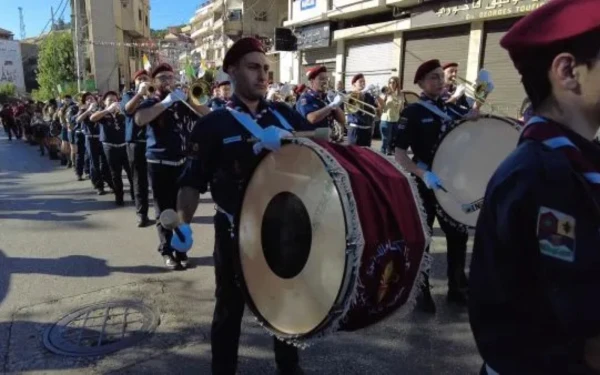Thousands of Christians came to Zahle (Lebanon), nicknamed “The City of 52 Churches”, on Thursday, May 30, to celebrate the Solemnity of Corpus Christi.
This year’s celebration had special significance, as it marked the 199th anniversary of a miraculous event credited with saving Zahle from an outbreak of bubonic plague.
Receive the main news from ACI Prensa by WhatsApp and Telegram
It is increasingly difficult to see Catholic news on social media. Subscribe to our free channels today:
Preparations for the festival began a week before, culminating with an emotional candlelight procession on the eve of Corpus Christi. The procession passed through the streets of Zahle, beginning at the Monastery of Saint Elias Al-Touak and concluding at the Melkite Cathedral of Our Lady of Liberation.
The faithful walked and prayed in unison, guided by the moving sound of the trumpets. The procession culminated with a blessing granted by Melkite Patriarch Youssef al-Absi and Bishop Ibrahim Ibrahim.

At dawn on Thursday, the churches of the various Christian communities of Zahle were packed with faithful attending morning Masses. After the liturgies, a massive procession snaked through the city streets, temporarily stopping traffic due to its large size.
“This day has immense meaning for us in Zahle,” explained the Melkite Catholic Archbishop of Zahle, Bishop Ibrahim Michael Ibrahim. “Despite our denominational differences, Christians come together as one to glorify God present in the Bread and Wine. At Zahle, Christian unity has been a lived experience long before the term itself became popular.”
The tradition of celebrating Corpus Christi in Zahle originates at a crucial moment in the city’s history. In 1825, the bubonic plague, a devastating disease, spread through the region. Following the insistence of Bishop Ignace Ajoury, the residents of Zahle held a procession and offered fervent prayers before the Holy Eucharist. Surprisingly, the city was spared the wrath of the plague.
Although the festival of Corpus Christi originated in Belgium in 1246, Eastern Christians quickly adopted the celebration.
“For almost two centuries, this tradition has been meticulously passed down from generation to generation, ever since the Eucharistic miracle saved our city,” the archbishop said. “The importance of the Holy Eucharist has been ingrained in our hearts ever since.”
In a nation tired of several crises, Bishop Ibrahim Michael Ibrahim emphasized the enduring role of the Catholic Church in offering prayers for the “salvation” of Lebanon from contemporary “plagues” such as corruption.
“Through prayer, Zahle was delivered from a deadly plague two centuries ago,” he said. “Today, Lebanon is facing different types of plagues… and the Church has a crucial role to play in the spiritual well-being of the country through prayer.”
Translated and adapted by the ACI Prensa team. Originally published in ACI Mena.
